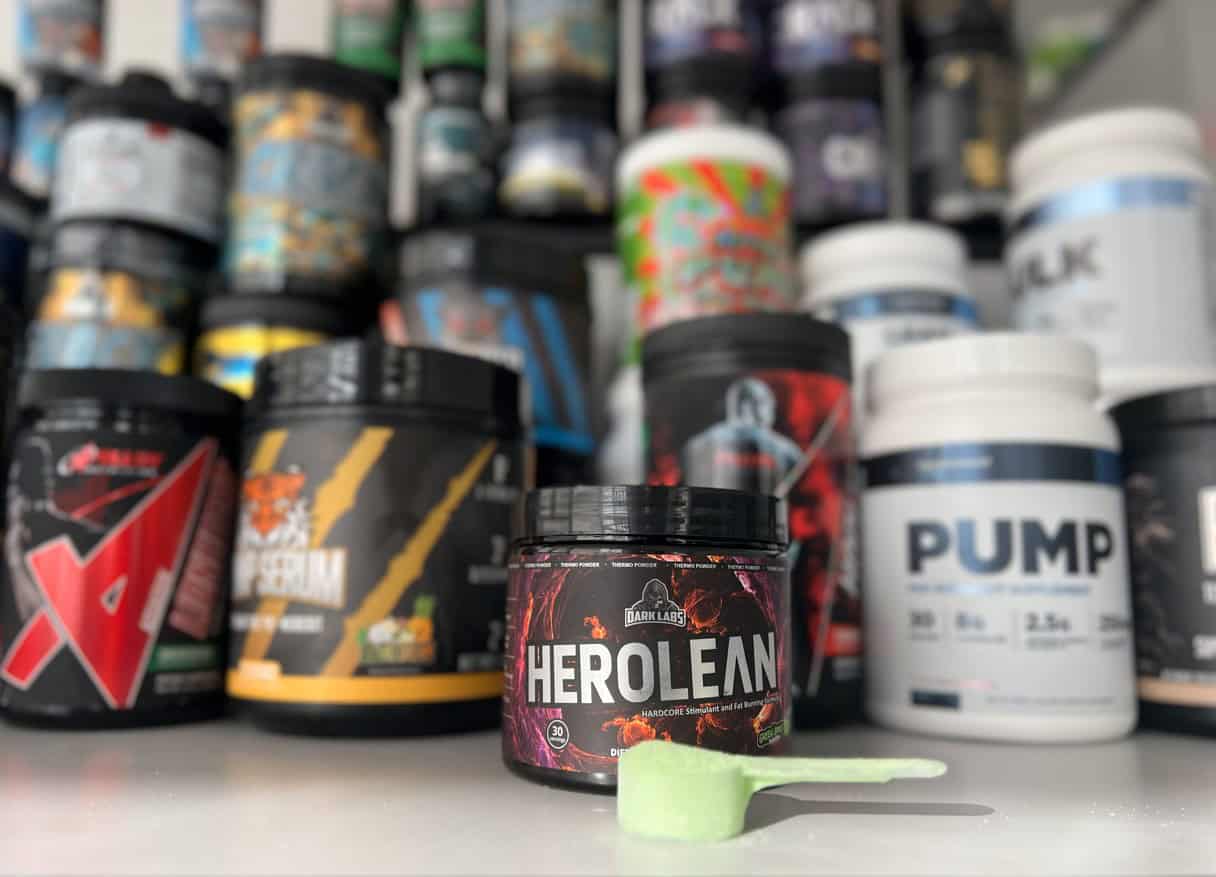
There are plenty of new pre-workouts and there are thousands already available.
The choices are almost infinite.
But the problem is, new pre-workouts can have ingredients that should be avoided.
One thing never changes in the supplement industry, and that's that transparency and honesty are always appreciated.
Some companies will use gray area or even harmful ingredients at the expense of your health.
Here's a quick list of pre-workout ingredients to avoid:
And here's a list of ingredients that have the greenlight for safety:

When it comes to pre-workouts, there are plenty of red flags to look out for.
If you see any of them, then you'll know it's not worth buying.
Proprietary blends
There is absolutely no reason why companies need to proprietary blends.
This used to be common practice in the 2000s, but these days, we know what the clinical doses are for ingredients.
And we also know what the doses should be for stimulants.
As much as we'd like to believe it, there are no secret sauces when it comes to combinations of ingredients and doses of them.
Yet, today there are still companies using proprietary blends and we think this is unacceptable practice to make their formulas look like it's something special.
Under-dosed ingredients
How much of each ingredient should be dosed is no secret.
If an ingredient needs to be between 1-4 grams to be effective, there is no reason why a company should put that ingredient dosed at 200mg or even 500mg.
Anything under that effective dose will be useless and it may as well not even be in the formula.
If you have a pre-workout that has around 5-10 grams per scoop with several ingredients, it likely uses underdosed ingredients.
There's no reason why you should pay $50-60 for a pre-workout that has significantly much less than a pre-workout that has 20-40 grams of ingredients in every scoop.
Total servings
This is a surefire to tell if a pre-workout is worthy especially if it only has 5-10 grams per serving.
If it has 30 servings at 1 scoop but uses instructions to use 2 scoops, leaving the bottle to only have 15 servings, then it's not really worth it unless this is a pre-workout that only costs $10.
Using chemical names
We've seen pre-workouts that try to confuse you by trying to look sophisticated.
For example, instead of using regular "caffeine", it'll state "1,3,7-Trimethylpurine-2,6-dione".
While this is correct, it's trying to look confusing to consumers and it should be easy to understand.
It's Your Choice
Depending on your preference, this may be okay for some people.
But it's important to know these red flags so you can make an informed choice on your next pre-workout.
However, if you want to make the most of your pre-workouts (and wallet), then you'll want to look for the best pre-workouts.
These pre-workout ingredients should be avoided especially if you're a beginner and are not experienced with pre-workouts.
Aminosioheptane (DMHA)
DMHA was created and discovered in the hopes it would replace DMAA as it was about to be banned at the time.
It's milder than DMAA but long-term safety isn't researched.
Although it doesn't increase heart rate or blood pressure, it can make energy much more potent when it's combined with other stimulants.
1,3 Dimethylamine (DMAA)
DMAA is a risky stimulant.
While on its own, it doesn't increase heart rate or blood pressure but when it's combined with other stimulants, it's more likely to have side effects.
Once it gets past the 70mg mark, it can be problematic and the risk for side effects increases significantly.
This is one to avoid if you want to ensure the best for your health.
Synephrine
Synephrine is similar to ephedra but it's marketed to be safer.
While it is safer, it isn't completely safe from side effects.
Synephrine can increase blood pressure and has various effects on the cardiovascular system.
And like the other ingredients listed here, there isn't a safe dosage determined yet.
Yohimbine
If you don't like anxiety and jitters, then you probably should avoid yohimbine.
This stimulant can increase anxiety, as well as blood pressure and other issues.
Although it's used in ancient medicine, sometimes pre-workouts will contain as much as 15mg of it where recommended doses are between 5 to 10mg.
High doses of caffeine or stimulants
Companies have noticed that people respond highly to energy, which has led to higher and higher caffeine dosages in pre-workouts.
It's not uncommon these days to find pre-workouts will have an average of 300mg of caffeine, not to mention other stimulants.
While it's safe to consume 300mg of caffeine, if you're not used to it, then it can have unwanted side effects like anxiety and jitters.
You don't need more than 100-250mg to have a good workout and sometimes less is more as you want the minimum without increasing your tolerance and it may also interfere with sleep if you take too much.

Here is a list of ingredients that have the greenlight for safety:
Citrulline
This is an amino acid that can increase vasodilation by widening blood vessels.
The dosage can vary but the minimum of pure citrulline required for benefits is 3 grams and for citrulline malate, it's 6 grams.
Citrulline can help improve blood flow, which can enhance pumps and recovery as well as nutrient delivery.
Betaine Anhydrous
Betaine works by increasing strength and power.
It also has benefits for muscle growth as it can increase muscle protein synthesis.
Research has shown benefits from 1.25g to 2.5g per day.
Creatine
Creatine is one of the most researched and safe ingredients to use.
It can increase ATP production and help with recovery.
It'll also help with muscle size as it can increase water retention, which can also help with muscle protein synthesis.
Beta-Alanine
If you feel tingles with your pre-workout, it's probably from this ingredient.
Beta-alanine is a safe ingredient that can improve endurance and strength while also reducing muscular fatigue.
Clinical dosages are anywhere from 2.5g to 6.4g per day.
Caffeine
Caffeine can increase alertness by inhibiting the enzyme that makes you feel tired and that's adenosine.
The benefits range from increased endurance, to work output, and much more.
you can use up to 3mg per kg of body weight or 6mg per lb.
BCAAs
Amino acids are beneficial for muscle building but it isn't completely necessary.
It can increase muscle protein synthesis and prevent muscle breakdown.
Theobromine
Theobromine is the cousin of caffeine as it's related.
Although it works similarly to caffeine, it has more of an effect on mood than regular caffeine does.
More
There may be more.
If you want a company that uses ingredients that are completely safe when used as instructed, then I recommend checking out Transparent Labs since they have the most trustworthy line of supplements.
And more is not always better, these are the basics and they are the most effective when it comes to assisting with workout performance.
We don't want to flat-out call out companies as we like to think they may change some day.
But we'll tell you how to spot them...
Some company names have "labs" in them and they aren't always good companies.
Typically a company will put "labs" in their name and then use all the things above in the "avoid" section while trying to maximize profits by charging a premium.
This is especially noticeable when they use "labz" instead of "labs".
The majority of influencers on social media are not the best source of information when it comes to fitness and health.
If you read the labels on the supplements they recommend, you may notice that they either underdose or try to use proprietary blends to confuse consumers.
Or they just recommend them for the sake of a big commission that they'll earn if you buy from their links or discount codes.
These supplements are easy to spot luckily.
In general, pre-workouts are not bad for your heart but when you consume more than 200mg of caffeine, it can increase the risk of elevated blood pressure and even heart attacks for those who suffer from coronary disease.
Since caffeine, and other stimulants can cause vasoconstriction (reduces blood vessels), this can reduce blood flow to muscles.
And it can reduce hydration by functioning as a diuretic.
You can seek out a medical professional for approval to use pre-workouts if you think you need to.
So taking a pre-workout with vasodilation enhancers like nitric oxide boosters is a good idea, if not then look into a pure nitric oxide supplement.
Pre-workouts can also be non-stimulant, meaning they can be free of caffeine and stimulants which can cause vasoconstriction.
Pre-workouts are safe to use as long as you follow the recommendations for servings.
Pre-workouts come in big numbers when it comes to the selections.
Some pre-workouts have specialties like better focus, higher energy, or mood elevation, depending on the formula.
But to make things simple, choose something that has the following:
If you have any questions, feel free to leave a comment or contact me and I'll help you.
Useful Links
 About FitFrek
About FitFrekFitFrek operates as an independent platform, offering comprehensive workouts, programs, routines, guides, and unbiased reviews to accelerate your progress. We pride ourselves on our honesty, delivering straightforward and candid insights. FitFrek does not offer medical advice, diagnosis, or treatment services.